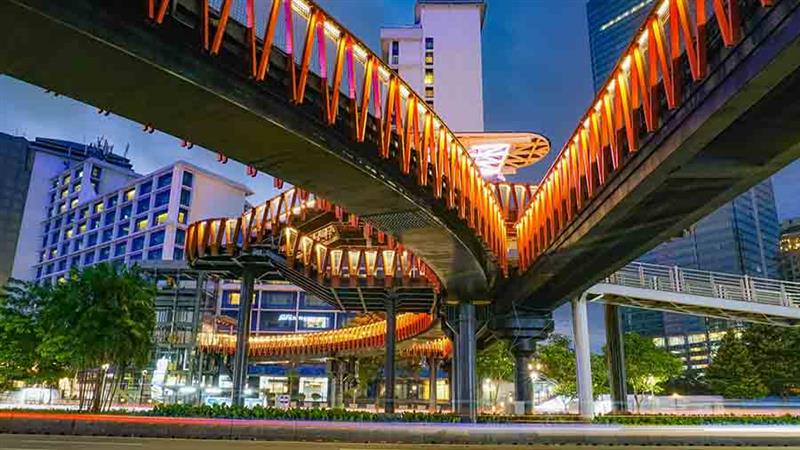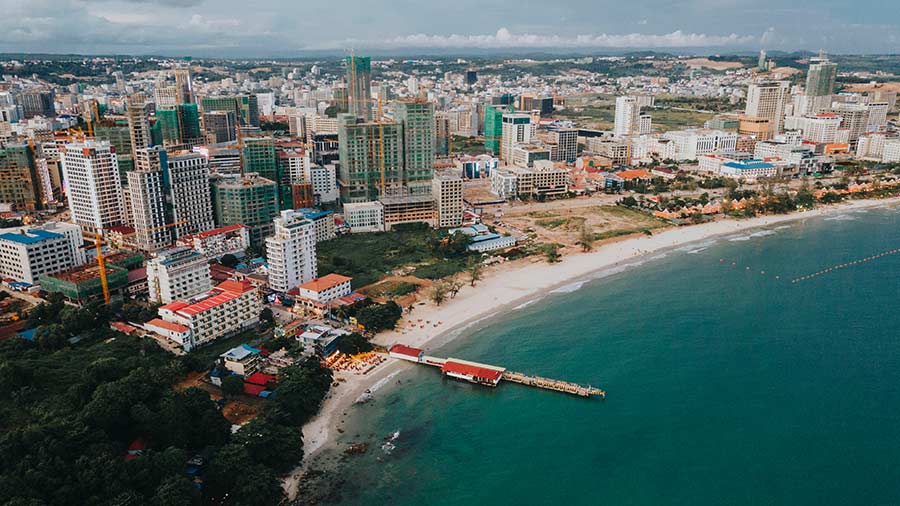Investors should assess their specific needs carefully before deciding which corporate structure to operate from. Using a reliable local advisor is recommended for first-time investors in the country, as they find it easier to remain compliant with applicable regulations.
There are two legal options for foreign investors looking to set up in the country:
Foreign investment company (PT PMA)
Establishing a foreign investment company or PT PMA, is the preferred structure for companies to establish a legal presence in the country. Foreign investors should have a minimum paid-up capital equivalent of 10 billion rupiah (US$696,000), an increase from the previous 2.5 billion rupiah (US$174,135), as the government aims to attract more high-value investments into the country.
Prior to setting up, applicants should study the new Positive Investment List (PIL) to see which business sectors are unavailable or restricted for foreign ownership. The general principle under the positive investment list is that a business sector is open to 100 percent foreign investment unless it is subjected to a specific type of limitation.
Advantages of PT PMAs
When compared with a KPPA i.e. RO, there are several advantages of setting up a Foreign Investment Company (PTPMA) in Indonesia, such as:
- Special financial and non-financial incentives, particularly in pioneer industries;
- Incentives for setting up in special economic zones (SEZs);
- Foreign investors can own as little as one percent and as much as 100 percent of the company (depending on the industry);
- Able to participate in government sponsored business tenders in the country;
- Ease of processing for business licenses;
- Ease of processing for work permits;
- Lower tax and import duties;
- Simple organization structure (requiring only one director, one commissioner, and two shareholders); and
- Ability to sponsor foreign executives.
What are the set-up requirements for a foreign investment company?
Investors looking to incorporate a PT PMA need to adhere to the following requirements:
- A minimum paid up capital of 10 billion rupiah (US$696,000);
- Appointment of two shareholders (these can be foreign individuals or corporations - the percentage of local involvement will depend on the foreign ownership limitation based on the PIL);
- The appointment of at least one commissioner and a director (these can be held by foreign individuals); and
- The director will be responsible for running the day-to-day activities of the company.
Set up process for a PT PMA
Establishing a PT PMA will require that the following steps be fulfilled:
- Reserve a company name with the Ministry of Law and Human Rights (which should not be similar to. the name of other companies or contain vulgar language). Further, the company name shall consist of 3 words and can be in English;
- Determine the industrial business classification code (KBLI), based on the intended business activities;
- Establish a legal entity with the company’s activities stated in the Deed of Establishment (this must be done with a local notary and the Deed of Establishment will have to be ratified by the Ministry of Law and Human Rights);
- Obtain a taxpayer identification number from the local tax office and a domicile letter from the district government (businesses established in Jakarta do not require a domicile letter);
- Obtain a tax registration certificate through the tax office where the business is domiciled;
- Obtain a Business Identification Number (NIB) by applying through the Online Single Submission (OSS) system. The NIB applies as the company’s import identification number, customs ID, and registration certificate. Further, the NIB will also automatically register your company under the government’s health and social security scheme; and
- Some companies may need to apply for additional business licenses (such as for mining and fintech). Business licenses will now be issued based on the assessment of the ‘business risk level’ determined by the scale of hazards a business can potentially create.
What are the requirements to obtain a business license?
The requirements vary depending on the risk level of the business with those in the high-risk categories requiring more permits and licenses.
The first stage of the process is obtaining a business registration number (Nomor Induk Berusaha – NIB) through the OSS system. To register for an NIB, businesses will need to provide the following information:
- Taxpayer number (Nomor Pokok Wajib Pajak– NPWP);
- Business activity code according to the KBLI;
- Business profile;
- The capital structure of the business; and
- The proposed location of the business.
Furthermore, the OSS system will be linked to all relevant ministries, such as the Ministry of Finance, the Ministry of Home Affairs, and the Ministry of Law and Human Rights.
Risk-based business licensing for a PTMA
Business licenses are issued to PT PMAs in some sectors only once an assessment of their ‘business risk level’ has been conducted. Such assessments aim to determine the scale of hazards a business can potentially create.
The government undertakes the analysis for business activities in the following sectors:
- Maritime affairs and fisheries;
- Agriculture;
- The environment and forestry;
- Energy and mineral resources;
- Nuclear energy;
- Industry;
- Trading;
- Public works and housing;
- Transport;
- Health, medicine, and food;
- Education and culture;
- Tourism;
- Religious affairs;
- Post, telecommunications, broadcasting, electronic systems, and transactions;
- Defense; and
- Employment.
What is involved in a Risk Assessment of a PT PMA?
The government conducts a risk analysis of each PT PMA application to determine the risk level, before deciding on issuing a business license. This comprises of:
- Identifying the relevant business activity;
- Assessing the hazard level;
- Assessing the potential occurrence of hazards;
- Determining the risk level and business scale rating; and
- Determining the type of business license.
Based on the aforementioned risk analysis, the business activities undertaken by the applicant company will be classified into one of the following types:
- Low-risk businesses;
- Medium-low risk businesses;
- Medium-high risk businesses; and
- High-risk businesses.
Assessed Risk Levels for a PT PMA
Low-risk business activities
Low-risk business activities are only required to obtain an NIB to commence their operations. In addition to serving as the formal identity of the business, the NIB also serves as a company’s import identification number, as well as the number for registering with the national social insurance program.
Medium-low-risk business activities
Business activities in this category must obtain a NIB and Certificate of Standards before beginning operations. A Certificate of Standards is a statement of the fulfillment of certain business or product standards, which must be filled in through the OSS system.
The NIB allows the business to conduct activities from ‘preparation to the commercial stage’.
The preparation stage includes:
- The procurement of tools or facilities;
- Land acquisition;
- Recruitment of manpower;
- Feasibility studies;
- Financing operations for the construction phase.
The commercial stage includes:
- The production of goods/services;
- Distribution of goods/services;
- Marketing of goods/services; and
- Other commercial activities.
Medium-high-risk business activities
For medium-high-risk business activities, companies will need to obtain an NIB and Certificate of Standards. However, the certificate will need to be verified by the central or regional government.
Once the central or regional government is satisfied the business has fulfilled the specific business standards, they will issue the ‘verified’ certificate and the company can begin the commercial stage of operations.
High-risk business activities
High-risk business activities will require a NIB and a license to operate. The license will be issued once the business has fulfilled certain conditions and verifications set out by the central or regional government, which may include an environmental impact analysis.
The NIB, however, allows the business to conduct activities in the preparation stage of operations.
Depending on the products or services being provided, businesses may have to obtain other supporting licenses to conduct commercial activities regardless of what risk level their activities are classified as.
An illustration of the licensing requirements can be seen below:
|
Business line |
Business scale |
Risk level |
License |
Issuing Authority |
|
Wholesale distribution |
Micro, small, medium, and large |
Low |
NIB |
Governor Regent or Mayor |
|
E-commerce operator |
Large and medium |
High |
NIB and license |
Ministry of Trade |
|
Freight forwarding |
All sizes |
Medium-high |
NIB and Certificate of Standards |
Governor |
Representative Offices
Opening an RO is the fastest and simplest way of establishing a legal entity in the country. This setup is a temporary arrangement – ROs are not allowed to engage in any commercial activities, issue invoices, sign contracts, or earn any revenue.
Foreign investors can own 100 percent of this business entity and don’t have to contribute the same paid-up capital required by PT PMAs.
The business activities of ROs are limited to market research activities, obtaining information on potential clients, developing trade contacts, and gathering information on regulations and laws.
We explore the four (4) types of ROs below:
- Foreign representative office (FRO);
- Representative office for a foreign trading company (TRO);
- Representative office for a foreign construction company (BUJKA); and
- Representative office for a foreign electricity company (JPTLA).
In addition, the law has simplified the process for establishing an RO in Indonesia.
The business activities of ROs are limited to – market research activities, obtaining information on potential clients, developing trade contacts, and gather information on regulations and laws. However, a BUJKA and JPTLA can generate revenue.
Foreign representative office (FRO)
A FRO is ideal for investors who are still exploring opportunities in Indonesia. The FRO is limited to non-commercial activities and there are no restrictions on the employment of foreign nationals. However, if an FRO does employ foreign workers, then it is also obligated to employ Indonesian citizens.
FROs are limited to:
- Acting as a liaison, coordinator, or supervisor to the foreign parent company;
- Preparing for the incorporation of a foreign investment company in Indonesia;
- Not participating in the management of the parent company’s branch office or subsidiary in Indonesia; and
- Not seeking revenues from Indonesia.
The FRO must be incorporated in an office building in the capital city of any province in Indonesia. Further, FROs are classified as low-risk business entities and thus only require a business identification number (NIB) and an FRO registration to begin operations.
Representative office for a foreign trading company (TRO)
A TRO acts as a selling, buying, or manufacturing agent for the foreign parent company and is prohibited from engaging in any trade or sales activities. To establish a TRO, an NIB, and a TRO Business License for the Trade Sector (Surat Izin Usaha Perwakilan Perusahaan Perdagangan Asing Bidang Perdagangan Melalui Sistem Elektronik – “SIUP3A Bidang PMSE”) is required.
Each TRO must have a SIUP3A, and if the TRO wants to conduct imports, then must be done through a local company holding a business license or a foreign investment company holding a general import identification number.
Foreign e-commerce organizers must establish a TRO if they fulfill the following criteria:
- Having more than 1,000 transactions with customers within a one-year period; and/or
- Delivered over 1,000 packages for customers within a one-year period.
Representative office for a foreign construction company (BUJKA)
A BUJKA is an RO for foreign construction companies, and unlike the KPPA and KP3A entities, a BUJKA can undertake projects in Indonesia through a joint venture with a local construction company. the BUJKA entity is required to obtain an NIB and a business entity certificate (Sertifikat Badan Usaha) (SBU).
In addition to making a joint venture with a local construction firm, the BUJKA is also required to adhere to the following:
- Fulfill all business licensing requirements;
- Hire an Indonesian as head of the BUJKA representative office;
- Utilizing sophisticated, efficient, and environmentally friendly technology;
- Prioritize the use of local construction materials;
- Employ more Indonesian workers than foreign workers at the expert level; and
- Carry out the transfer of knowledge and technology to Indonesian workers.
The joint venture with the local construction firm must also fulfill the various technical criteria such as stating the rights, responsibilities, and obligations in a written agreement between the cooperating businesses.
Further, at least 50 percent of the cost value of any construction work undertaken by the joint venture must be done onshore, and at least 30 percent of the cost value of the project shall be borne by the BUJK entity.
Representative Office for Foreign Electricity Supporting Services (JPTLA)
A JPTLA is a representative office for businesses in the field of electricity supporting services. The JPTLA must obtain a NIB and a business entity certificate.
The JPTLA business licensing is granted to the following activities:
- Construction of electricity installation;
- Consultation for electricity installation; and
- Maintenance of electricity installation.
The JPTLA can undertake high-cost electricity-supporting services with the following threshold:
- Projects for the construction and installation of electricity infrastructure worth at least 100 billion rupiah (US$6.9 million); or
- Projects for consultation in the field of electrical maintenance and installation worth at least 10 billion rupiah (US$696,000).
Further, the JPTLA representative office must appoint an Indonesian citizen in charge of the office and conduct technology and knowledge transfers to Indonesian workers. The JPTLA must prioritize the utilization of domestic products as well as the use of high-tech and environmentally friendly technology.
General set-up requirements for ROs
Foreign investors looking to open an RO will need to fulfill the following requirements:
- Register through the OSS online system;
- The parent company’s Articles of Association legalized by a notary and the Indonesian Embassy of the parent company’s country of origin;
- Letter of Appointment by the Indonesian Embassy located in the parent company’s country of origin;
- Latest financial statements of the parent
- Letter of intent legalized by a notary and the Indonesian Embassy located in the parent company’s country of origin;
- Certificates demonstrating competency in the relevant industry or sub-sector;
- Lease agreements;
- Must be located in the capital of a province; and
- A letter that states the RO will not engage in any commercial activities in Indonesia.
Individually incorporated companies
Individually owned companies are a new type of company category that can be incorporated by a single individual, who is at least 17 years of age. This category of company is for Indonesian citizens only. An individually owned company is only applicable to businesses categorized as micro or small enterprises. Businesses categorized as micro or small enterprises must fulfill the following capital or annual sales criteria.
|
Enterprise scale |
Capital |
Annual sales |
|
Micro |
Up to 1 billion rupiah (US$69,000), excluding land and buildings |
Up to 2 billion rupiah (US$138,000) |
|
Small |
More than 1 billion rupiah (US$69,000) and up to 5 billion rupiah (US$345,000), excluding land and buildings |
More than 2 billion rupiah (US$138,000) and up to 15 billion rupiah (US$1 million) |
The incorporation of an individually owned company does not require a deed of establishment, rather the individual only needs to fill out an establishment statement through the Ministry of Law and Human Rights (MOLHR) website to obtain a registration certificate.
The statement must include the following information:
- Name and domicile of the company;
- Purpose and business activities of the company;
- The amount of authorized, issued, and paid-up capital of the company;
- Number of shares of the company;
- Details of the founder of the company; and
- Tax number of the founder of the company.
The individually owned company must change its legal status to a limited liability company if the number of shareholders is more than one person or the business no longer meets the criteria of a micro or small business. Another important aspect with regards to an individually owned company is that its liability is limited to the company’s capital.
Minimum authorized capital required
The amount of paid-up capital is to be agreed upon by the founder(s) of the company. Once the founder(s) of the company have agreed on the amount of authorized capital, they must pay at least 25 percent of the total paid-up capital, and the proof of payment must be electronically submitted to the MOLHR within 60 days from the date of establishment.
Obligation to file financial statements
Financial statements of individually owned companies must be submitted within six months of the end of their accounting period. Failure to submit financial statements will result in administrative sanctions ranging from a written warning to the suspension of business activities.
Key changes foreign businesses should know about the government regulation in Lieu of Law No. 2
New protection and empowerment measures for small businesses
Indonesia’s Government Regulation 7 of 2021 (GR 7/2021) looks to provide greater protection and empowerment to Indonesia’s cooperatives, micro, small, and medium-sized enterprises (MSMEs).
GR 7/2021 provides several facilities to encourage the growth of local MSMEs, such as mandating regional governments to provide at least 30 percent of the total land area for commercial areas for the promotion and development of MSMEs. In addition, the regulation has made it easier for MSMEs to obtain a business license, tax reductions, and reliefs, and are exempt from paying the provincial or the regency/city minimum wage.
New MSME criteria
GR 7/2021 expands the criteria for an MSME. Previously, there were only two criteria: assets and revenue, and each had its own threshold for a company to be recognized as an MSME. Under GR 7/ 2021, MSMEs are categorized by their business capital or annual sales. The criteria exclude land and buildings.
Micro enterprises
Micro enterprises are businesses that have capital of no more than 1 billion rupiah (US$ 64,701) and annual sales of no more than 2 billion rupiah (US$129,403).
Small enterprises
Small enterprises are businesses that have capital of more than 1 billion rupiah (US$64,701) and annual sales of more than 2 billion rupiah (US$129,403) but less than 5 billion rupiah (US$323,508).
Medium enterprises
Medium enterprises are businesses with a capital of more than 5 billion rupiahs (US$323,508) and annual sales of more than 15 billion rupiahs (US$970,524) but less than 50 billion rupiahs (US$3.2 million).
Ease of obtaining a business license
The Omnibus Law has implemented a centralized business licensing system. An MSME only needs to submit their national ID and a reference letter from their neighborhood association online to receive their business number.
The government will provide technical guidance, consultation, and training for all MSMEs in this process, hoping it will also increase their knowledge of national standards, such as for Halal certification, as well as other regulatory certificates.
Ease of obtaining financing and incentives
MSMEs are able to use their business activity as a form of credit guarantee to obtain financing. Additionally, their tax administration process has been simplified.
Micro and small enterprises are eligible for incentives in the form of:
- Regional tax reduction or relief;
- Regional fee reduction or relief;
- Subsidized loans;
- Capital for MSMEs with innovative products that have market potential or are technology-based;
- Financing of intellectual property rights;
- Vocational training; and
- Support for research and development.
The government can act as a guarantor for up to 80 percent of loans or financing provided by banks and other non-bank financial institutions to MSMEs.
Micro and small businesses must first fulfill the following criteria:
- Must have just started business operations or are already operating;
- Have a gross income of no more than 7.5 billion rupiah (US$485,262) per year;
- The business activities are in:
- Agriculture;
- Plantations;
- Livestock;
- Guesthouses/hostels;
- Boarding houses;
- Campgrounds;
- Industry;
- Transportation;
- Restaurants; and
- Stalls; and/or
- Procure government goods or services electronically.
Medium-sized enterprises and large businesses can also receive the above-mentioned incentives if they develop export-oriented products, hire a local workforce, utilize micro or small enterprises to expand the business, and train and provide upskilling programs for micro or small businesses.
MSMEs are also exempt from paying the regional/city minimum wage rates.
Priority location and development
GR 7/2021 mandates that ministries, state-owned enterprises, and regional-owned and private businesses must allocate 30 percent of their commercial areas, shopping centers, and public infrastructure for the promotion and development of MSMEs. Public infrastructure includes airports, toll road rest and service areas, railway stations, and terminals.
The rental fee for the area used for the promotion of the MSME should not exceed 30 percent of the commercial rental fee.
Government and state-owned entities to help facilitate demand
The central and regional government(s) must allocate 40 percent of their goods and services procurement budget for MSMEs.
Cooperatives
There are new provisions to assist Indonesian cooperatives. GR 7/2021 reduces the requirement of primary cooperatives from 20 members to nine, and cooperatives can now be either single-purpose or multi-purpose cooperatives, aimed at attracting more members through this enterprise.
Shariah-based cooperatives
GR 7/2021 allows for the establishment of Shariah-based cooperatives, but the entity must contain the word ‘Shariah’ in the official name, and the Shariah principles must be stated in the cooperatives’ articles of association.
Obligation to file financial statements
Financial statements of individually owned companies must be submitted within six months of the end of their accounting period. Failure to submit financial statements will result in administrative sanctions ranging from a written warning to the suspension of business activities.
Business licensing regime
Indonesia has now introduced a new business licensing regime whereby business licenses are issued based on the assessment of ‘business risk level’, determined by the scale of hazards a business can potentially create. The business activities undertaken by the applicant company will be classified into one of the following risk-level types:
- Low-risk businesses;
- Medium-low risk businesses;
- Medium-high risk businesses; and
- High-risk businesses.
Positive investment list
Under the Law, Indonesia has liberalized over 245 business lines, including important sectors, such as transportation, energy, and telecommunications. The general principle under the positive investment list is that a business sector is open to 100 percent foreign investment unless it is subjected to a specific type of limitation. As such, the government has classified business fields into four categories.
- Business fields that are fully open to foreign investment;
- Priority sectors;
- Business fields that stipulate specific requirements or limitations; and
- Business fields are open to large enterprises, including foreign investors, but are subject to a compulsory partnership with cooperatives and micro, small, and medium-sized enterprises (MSMEs).
Labor laws
The Law has amended Indonesia’s labor laws. Changes include a formula for calculating the minimum wage, eliminating sectoral minimum wages, introducing provisions for hourly wages (for the first time), and income support for workers made redundant. Further, a new procedure for the disbursal of severance payments has been established.
Tax overhaul
The government has overhauled the existing tax structure to optimize tax revenue collection. The overhaul includes changes in the topline personal income tax rate. Individuals earning more than 5 billion rupiah (US$351, 000) per year in net income will now be subject to a 35 percent income tax, and individuals with an annual net income of up to 60 million rupiah per year (US$4,220) will be subject to a five percent tax rate, up from the previous threshold of 50 million rupiah (US$3,517).






















